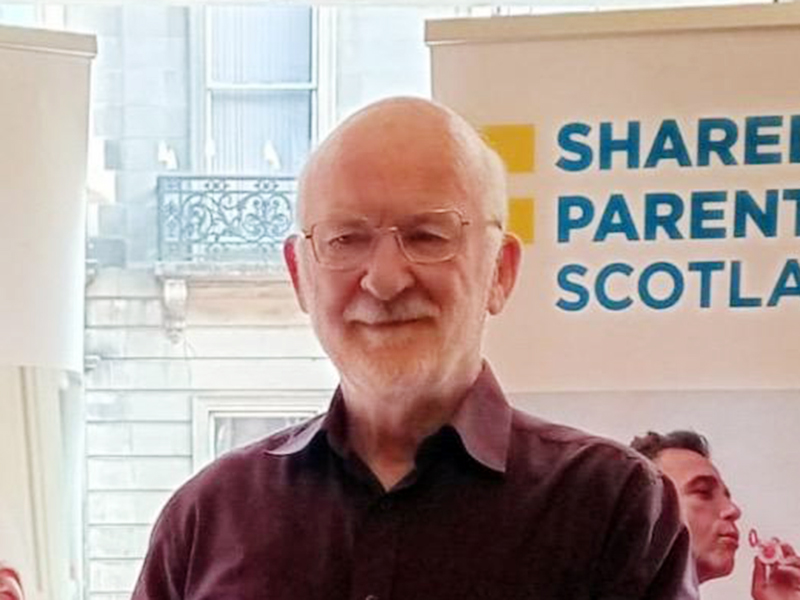Shared Parenting Scotland's thoughts on World Suicide Prevention Day (10 September)
What can you do when the phone suddenly goes dead at the end of a distressed and distressing hour-long call on the helpline?
Or the mother or father on the other end quietly signs off with "there's nothing left for me", and you don't know what you might hear about them next?
Or you open your email in the morning to find a tormented whirlpool of thoughts, sent sleepless in the darkest hours of the night. Good thinking seldom happens alone and cold at 3.30am.
Shared Parenting Scotland isn't a suicide prevention organisation. We aren't specialists but we never know what we will hear when we pick up a helpline call. We are often the last line of defence against desperation.
We have obligations to the caller. We will share the contact numbers for Breathing Space and Samaritans and other dedicated mental health organisations. We hear back from some callers that the directness of that conversation was lifesaving by itself.
Shared Parenting Scotland has obligations to its staff. We know from our suicide prevention training that no-one can say for sure what was the last straw for someone who takes their own life. It is that individual’s decision. But it’s not easy.
However, we can draw some insights from our casework over 15 years. In the context of mothers and fathers who have lost, or are losing, contact with their children, we developed our course called Love, Loss and Living to help them recognise and acknowledge their own feelings of grief and bereavement.
The course first explores the love you have for your child, the neuroscience of love, and the loving-kindness meditation. It then explores loss, the impact of your emotions, others’ emotions, the culture of loss, and psychological models of loss. Finally, Love, Loss and Living explores healthy coping strategies, the power of self-care, and setting goals for the next 12 months to help you think positively. To carry on.
Thanks to funding we are able to provide the courses free of charge.
We also hear repeatedly from callers – mothers, fathers and grandparents – of their shock and bewilderment at what they call the brutality of the adversarial legal approach to resolving disagreements about parenting after divorce or separation. They feel on trial, having to prove their worth to stay in their child's life.
And there's the cost. Some have run up debts they can never hope to repay.
They may be facing homelessness because of the relationship breakdown, feeling ashamed that they have nowhere to take their children even if they are awarded time with them. Homelessness is a recognised risk factor in suicide
Our greatest wish is for an overhaul of the Scottish approach to parenting after separation that does not find parents competing for time with their children by attacking and undermining each other’s character and competence.
A father reported recently that he wept in court as he felt the relationship with his children being erased in front of him. The sheriff reprimanded him for failing to control his emotions and indicated that would be another reason for restricting his parenting time. “I guess I was showing the wrong type of emotion,” he said.
At Shared Parenting Scotland we see every day how important it is to feel heard, understood and connected. Parents who call our helpline or join our group meetings across the country often tell us that these conversations are a lifeline, a reminder that they are not facing separation or battle to stay in their chiild’s life alone.
This kind of support connects directly with Scotland’s national priorities. Creating Hope Together, Scotland’s suicide prevention strategy, highlights the need for safe spaces, timely support and communities that tackle stigma around mental health.
Additionally, we play a part in A Connected Scotland, the strategy for tackling social isolation and loneliness. Family separation can be an isolating experience. Our groups and peer connections help rebuild a sense of belonging and community. Parents tell us that meeting others who “get it” makes a huge difference. Many return for continuing support or to offer their learning and peer support to others.
We are contributing to Scotland’s wider effort to reduce loneliness, strengthen the resilience and capacity of individuals and communities, and ultimately, prevent suicide. At Shared Parenting Scotland we are doing what we can, one caller at a time, but Scotland needs to do more at all levels of policy and practice, to support parents make better decisions in the long term interests of their children at the time they may feel least able to.
Our children have a right to both parents. Alive.
John Forsyth is policy manager for Shared Parenting Scotland
If you or someone you know is going through a tough time, you're not alone. Samaritans can help - call freephone 116 123 or email [email protected].







